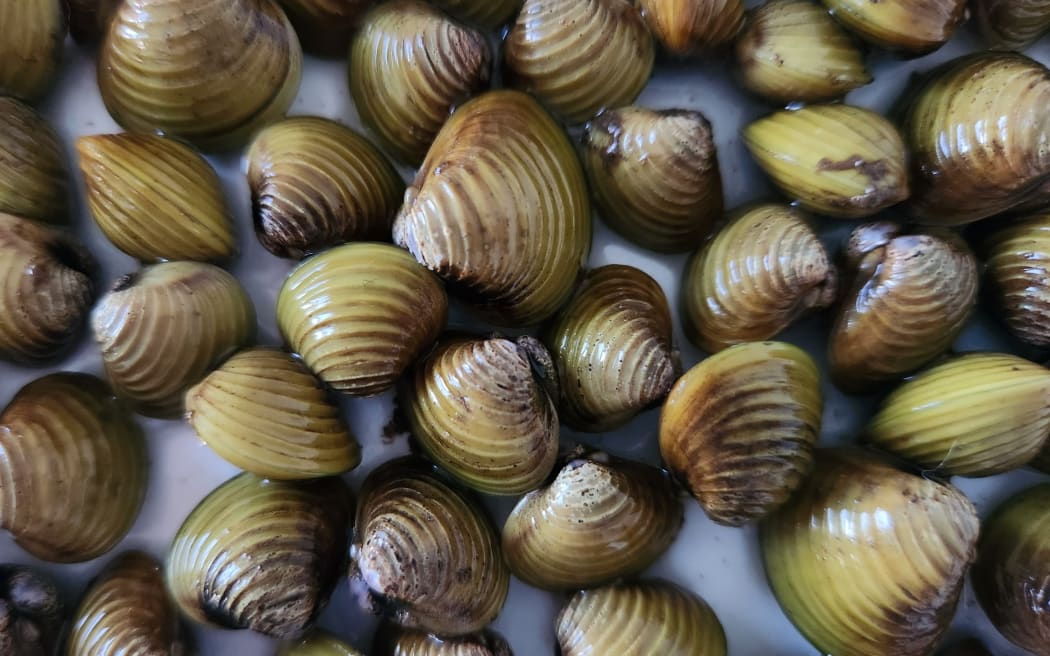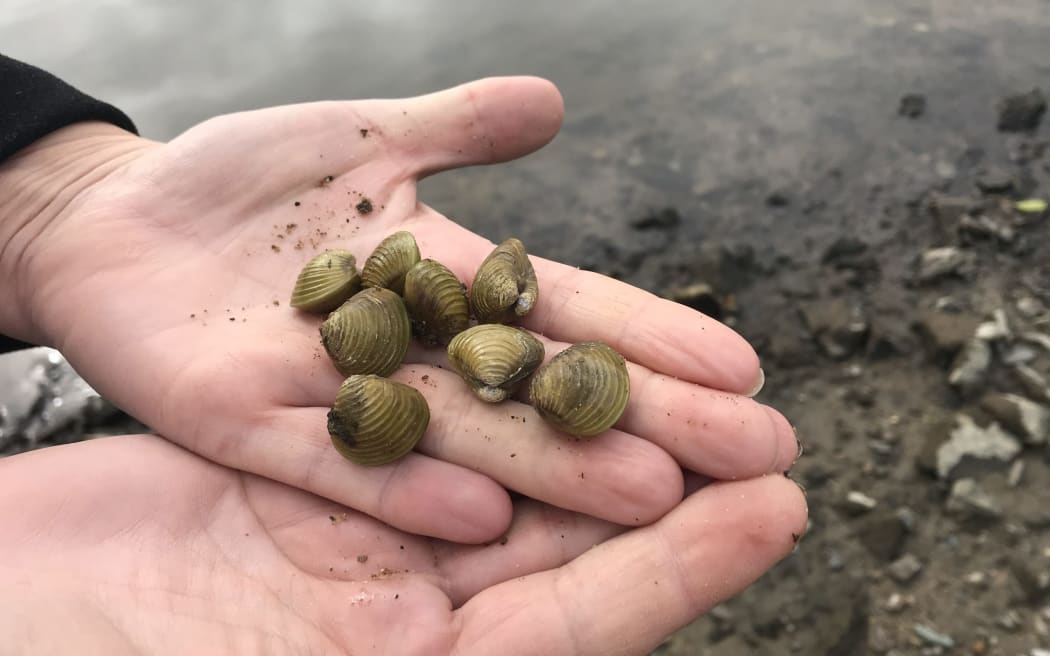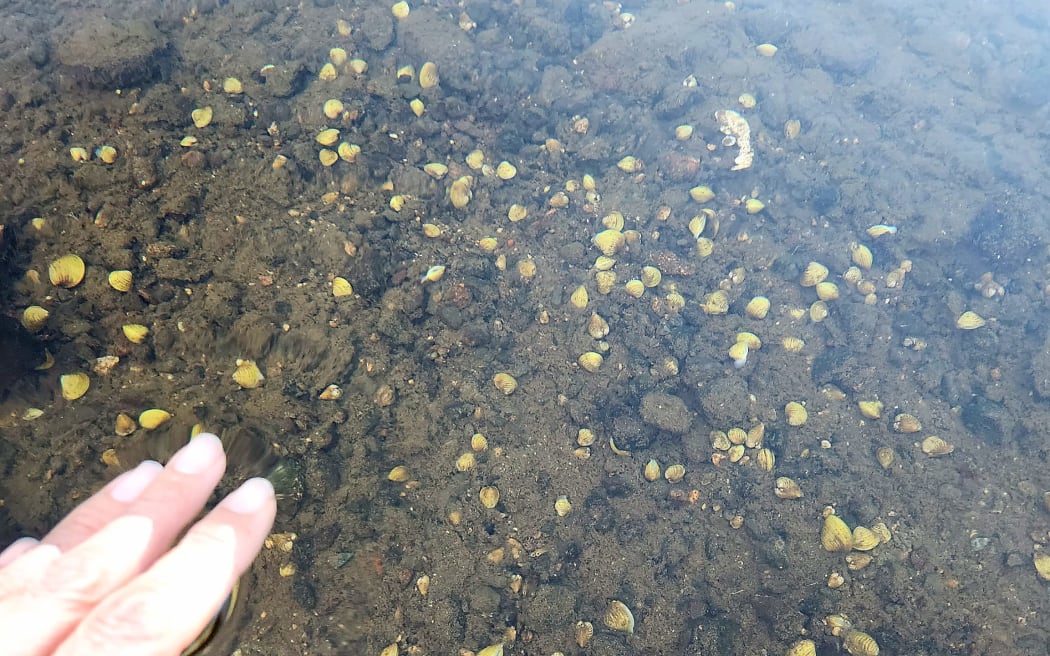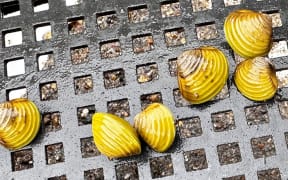
The spectre of freshwater gold clams looms over Northland's Lake Taharoa as the busy summer tourist season looms. The clams are New Zealand's first invasive freshwater pest shellfish. Photo: Supplied / MPI
The boat ramp at Northland's most popular recreational lake will remain open to boaties this summer despite fears about a new invasive freshwater gold clam.
The ramp is used by thousands of people to access Kai Iwi Lakes' Lake Taharoa, one of the largest and deepest dune lakes in the world. Authorities are worried about its open access hastening the arrival of freshwater gold clams from Waikato.
The new shellfish have not arrived in Lake Taharoa yet, but about 75,000 people are expected to flock to the tourist mecca over summer, raising the risk of spread.
The clam was first found in New Zealand in the Waikato River in May.
Biosecurity NZ has surveyed lakes and rivers linked to the Waikato River, through activities like boating.
Its recent investigation found the pest had not arrived at Lake Taharoa.
However, Northland Regional Council (NRC) warned there was an urgent need to prepare as the spectre of the pest grows.

An NRC staff report recommended immediately closing the Lake Taharoa boat ramp this summer because of the freshwater gold clam - until October 2024.
However, Kaipara District Council (KDC) voted in late November to keep the boat ramp open and focus on education instead.
About 20,000 campers stay at the council's Lake Taharoa campgrounds at Kai Iwi Lakes each year, where boating and water sports are popular.
Another up to 80,000 day trippers will visit the lake just north of Dargaville too.
The clam has been identified along 225km of Waikato River, stretching most of its length from almost at its Lake Taupō start to its Port Waikato end.
NRC pou tiaki taiao group manager environmental services Ruben Wylie said the situation was urgent.

Freshwater gold clams from the Waikato River. Photo: Supplied / MPI
Wylie said there was a risk of boats and gear being used in the large gold clam-affected section of Waikato River then being brought to Lake Taharoa, four hours' drive north.
NRC recommended the boat ramp's temporary closure to a 29 November KDC meeting - where the district council instead decided in a five to four vote, to keep the ramp open.
This move came in spite of KDC's co-governed council/Te Roroa/Te Kuihi Taharoa domain governance committee also wanting the ramp to temporarily close, in line with NRC.
"It is recommended that the Taharoa Domain governance committee closes the boat ramp as a means of reducing the risk of the clam becoming established at Lake Taharoa this summer," the NRC report said.
NRC leads a Taharoa lake protection staff group also including KDC, Te Roroa and Te Kuihi plus the Department of Conservation.
The regional council has just put $300,000 towards preparations for an emergency freshwater gold clam response ahead of any potential Lake Taharoa arrival.

Freshwater gold clams seen in the bed of the Waikato River. Photo: Supplied / MPI
Kaipara Mayor Craig Jepson said KDC would work with NRC, Biosecurity NZ and others on education around clam-specific 'check, clean, dry' procedures.
KDC's Lake Taharoa campgrounds are full for the summer peak.
KDC general manager customer experience Hayley Worthington said the council would have to refund $58,000 to campers if the boat ramp closure happened.
The closure would also mean $100,000 in extra council costs - for a full-time person employed to monitor the boat ramp and do accompanying education. There would also be the cost of a physical boat ramp barrier, signage and communication.
Worthington said KDC had notified all pending summer campers about the risk of freshwater gold clams.
Biosecurity New Zealand Deputy Director-general Stuart Anderson said it was illegal to knowingly transport the freshwater gold clam.
New government controls were brought in on 24 November for the 225km of Waikato River where the clam has been found.
These include a total ban on wake boats that have been used on the 225km affected stretch of Waikato River being used on any other lake, river or estuary. Wake boats have an internal water ballast area that cannot be completely drained or cleaned, meaning freshwater gold clams can be easily transported.
Anderson said the controls also included that all other watercraft and gear that comes into contact with this 225km must be treated with prescribed clam-specific 'check, clean, dry' processes before moving to any other New Zealand river, lake or estuary.
He said Lake Taharoa's distance from the Waikato River helped when it came to its risk from the pest.
"However, distance is not complete protection," Anderson said.
Worthington said only 1 percent of 160 Labour Weekend Lake Taharoa visitors surveyed owned wake boats and none of those who did were from Waikato.
Jepson, deputy-mayor Jonathan Larsen and councillors Mike Howard, Ash Nayaar and Rachael Williams were in favour of an education approach, while councillors Gordon Lambeth, Pera Paniora, Mark Vincent and Eryn Wilson-Collins wanted the boat ramp closed.
What's the risk to Northland?
The NRC staff report said the freshwater gold clam would hit Lake Taharoa hard if it became established as the Kai Iwi Lakes were already under stress with significant decline in submerged vegetation at the lake.
There was potential for a "significant loss of recreation values" as well as ecological and economic impacts if the clam became established, the report said.
"It could potentially dominate the lake beds.
"Prevention is better than cure as the (freshwater) gold clam has never been eradicated from an invaded location before," the report said.
Freshwater gold clams
- The invasive pest spreads through boating and human activity.
- Freshwater gold clams are prolific breeders, with each able to produce 400 offspring each a day without the need of a partner.
- The clams quickly infest the floors of lakes, rivers and estuaries' mixed brackish fresh and sea water zones.
- Their dense mats cover everything and totally change native freshwater ecosystems.
- The clams can live out of water for up to 10 days and there are no known tools to get rid of them once they are established.
Local Democracy Reporting is Public Interest Journalism funded through NZ On Air


